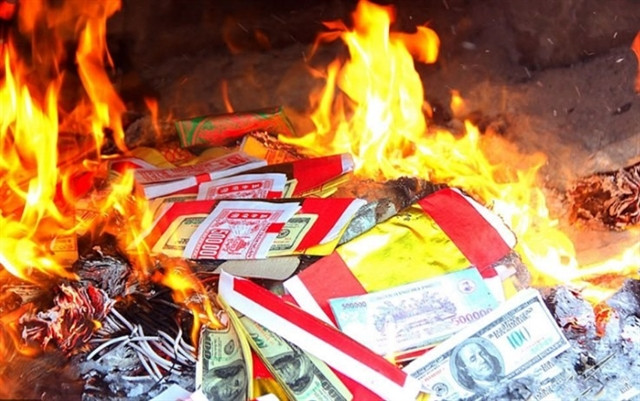 |
| There is not law to prohibit the act of burning votive objects but if the burning cause fire, it will be handled according to the law. Illustration photo bvhttdl.gov.vn |
The ministry said burning votive objects causes waste, potential dangers and can have a negative effect on the environment.
It also requested authorities to undertake inspection and supervision before, during and after the festivals so that to promptly prevent, discover and harshly punish violations, especially those acts such as superstition practice and gambling to make money taking advantage of the people beliefs and festival activities.
Ninh Thị Thu Hương, Director of the Department of Grassroots Culture (DGC) under the culture ministry last month issued an official dispatch urging departments of culture, sports and tourism, departments of culture and information of provinces and central cities to maintain a "civilised, safe, and economical lifestyle" during the Tết holidays and the Spring Festival 2024.
The DGC requested provincial and city cultural and sports authorities to advise localities to strengthen State management measures on festivals, raise awareness and responsibility of all sectors, people and tourists in implementing the Prime Minister's official dispatch dated January 30, 2024, a decree dated August 29, 2018 of the Government on festival management and organising, and other authorisation of the culture ministry.
It has also directed and requested festival organisers to strictly follow law and regulations while opening spiritual and cultural events ensuring security, order, and safety, protecting and promoting the values of national cultural traditions and customs.
Burning votive objects has been a common act in Vietnamese cultural and spiritual practices, particularly during festivals and those of worshiping at temples or pagodas. But in recent years, the Vietnamese Buddhist Association has recommended the Buddhist believers not burn votive objects in their private homes or in public areas.
According to Buddhist monks, the practice of burning votive objects is not a Vietnamese tradition, but is imported from foreign countries.
The act of burning votive objects, including paper horses or motor bicycles and others is wasteful and causes environmental pollution.
In some cases they caused accidents, including fires.
The time approaching and during Tết is very difficult to control the burning of votive objects. At worshiping facilities, historical and cultural relics, people often bring votive papers to burn with a variety of types and in shapes of animals or furniture such as horses, iPhones, TVs, refrigerators, houses, cars, airplanes, etc.
Many people have suggested that the authorities should ban the production of votive objects or impose heavy taxes on the production and the consumption of votive objects.
From a legal perspective, there are no laws prohibiting the act of burning votive papers, people can be prosecuted if it leads to a fire. VNS